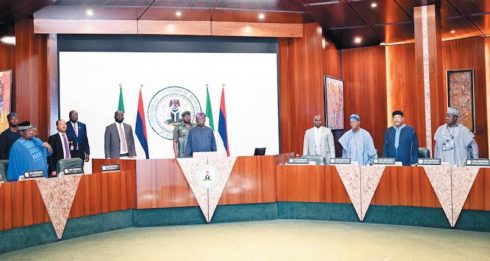On Monday, Nigeria Federal Executive Council (FEC), led by President Bola Tinubu, approved the much-anticipated Economic Stabilisation Bill. The bill is designed to enhance Nigeria’s economic stability by addressing key financial challenges and fostering long-term growth. The bill, once passed into law, is expected to bring substantial reforms to Nigeria’s financial system, including efforts to boost liquidity and create employment opportunities.
The bill will soon be transmitted to the National Assembly for legislative approval. It includes provisions that amend existing laws such as the Foreign Exchange Act and Companies Income Tax Act, aiming to revamp Nigeria’s economic landscape by encouraging electronic transactions and facilitating the inflow of international funds. This is seen as a critical measure in President Tinubu’s ongoing efforts to mitigate the impact of recent economic policies, including the removal of petrol subsidies and the floating of the naira.
Key Reforms in Foreign Exchange and Electronic Transactions
The Economic Stabilisation Bill is set to bring major changes to Nigeria’s Foreign Exchange Act. One of the key reforms is the promotion of electronic transactions over cash payments, which is intended to improve liquidity in the financial system. According to the Minister of Finance and Coordinating Minister of the Economy, Wale Edun, these reforms will grant the Central Bank of Nigeria greater authority to attract international funds and streamline foreign exchange transactions.
The bill aims to leverage international remittance services by creating more favorable conditions for foreign exchange businesses and money transfer organisations. These measures are expected to increase foreign inflows into Nigeria, thereby providing more liquidity to the economy. By encouraging electronic transactions, the government also hopes to reduce the reliance on cash-based activities, which have often hindered transparency and slowed down economic transactions.
Increased Employment and Entrepreneurship Opportunities In Nigeria
Another significant aspect of the Economic Stabilisation Bill is the proposed reform of the Companies Income Tax Act. This amendment will allow Nigerians to provide professional services to foreign companies without those companies needing to establish a physical presence in Nigeria. This reform opens up vast opportunities for Nigerian professionals to access international markets from home, leading to new streams of income and a rise in entrepreneurial ventures.
Minister Edun emphasized the potential of this provision to generate employment and entrepreneurship opportunities in the country. By allowing skilled Nigerians to operate locally while serving foreign clients, the bill seeks to alleviate some of the unemployment and underemployment challenges that have plagued the economy. With these reforms, Nigeria could see a surge in technology-driven businesses, consulting services, and other professional sectors that cater to international clients.
Overhauling the Fiscal Responsibility Act to Bolster Economic Growth
The FEC also highlighted plans to overhaul the Fiscal Responsibility Act as part of the Economic Stabilisation Bill. This reform is intended to guide government-owned enterprises in managing their finances more efficiently. It will require these enterprises to share surpluses with the government and establish reserve funds from their revenues. By doing so, the government hopes to create a more fiscally responsible environment that supports sustainable economic growth.
This reform is seen as a key tool in President Tinubu’s strategy to put the Nigerian economy back on the path of growth and stability. In light of the economic hardship caused by the removal of petrol subsidies and the floating of the naira, this move is designed to offer long-term economic relief. By strengthening the fiscal framework, the government aims to improve the standard of living for many of whom have been hit hard by inflation and currency fluctuations.
Table of Contents
Discover more from OGM News NG
Subscribe to get the latest posts sent to your email.














